|
 Fécamp 1928
Fécamp 1928 |
 Fecamp
1930 Fecamp
1930 |
|
1924 à 1927
- 1928
- 1929
-
1930
-
1931
-
1932
- 1933
-
1934
-
1935
-
1936
-
1937
-
1938
1929
|
|
24 janvier : d’abord ignorée sur la liste des stations autorisées par le décret de juillet 1928, Radio Normandie bénéficie tardivement d'une autorisation d'émettre grâce à l'intervention d'un député du Havre et du Ministre du Commerce et de l'Industrie
16 février : décret gouvernemental reconnaissant les droits de l'émetteur de Fécamp, grâce au soutien du député Georges Bureau |
January 24: initially ignored on the list of stations authorized by the decree of July 1928, Radio Normandie belatedly benefits an authorization to broadcast thanks to the intervention of a deputy from Le Havre and the Minister of Trade and Industry
February 16 : government decree recognizing the rights of the Fécamp transmitter, thanks to the support of deputy Georges Bureau |
|
Juillet 1929
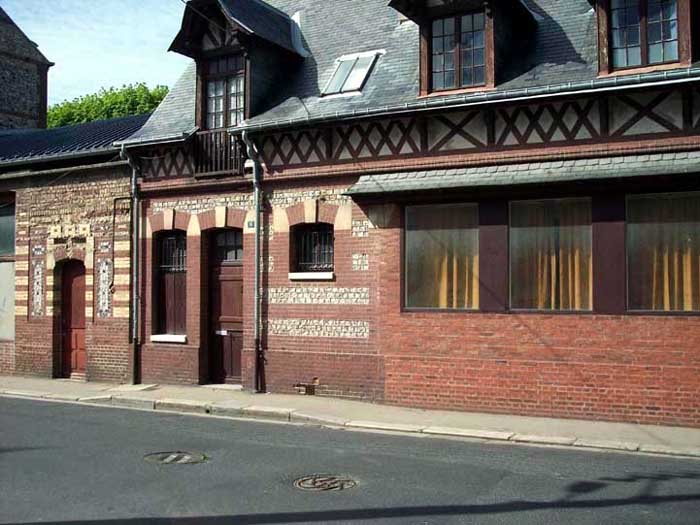
Les radios-clubs de la région se réunissent et créent la Fédération des Radios-clubs de Normandie.
La salle de réunion sera aménagée ici rue Georges Cuvier à Fécamp, à proximité de Vincelli-la-Grandière
The region's radio clubs come together and create the Normandy Radio Club Federation.
Yhe meeting room will be set up here rue Georges Cuvier in Fécamp, near Vincelli-la-Grandière
Août 1929
Déplacement des installations émettrices sur les hauteurs de Fécamp
August 29 : transmitter relocated to the heights of Fécamp

Travaux sur la liaison vers l'antenne. M. Le Grand sécurise l'échelle pour son assistant !
Work on the link to the aerial. Mr Le Grand secures the ladder for his assistant!
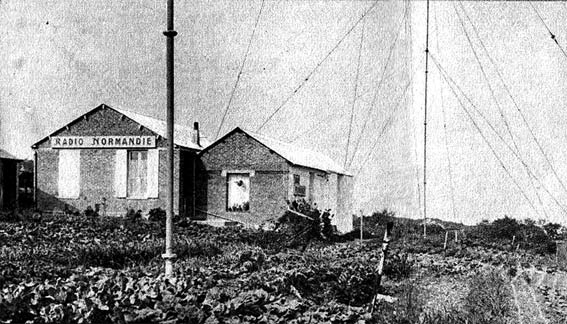
Les deux mâts de trente mètres et la cabane provisoire de l'émetteur sur la falaise ouest en été 1929
La hauteur des mâts sera bientôt portée à 50 mètres
The two thirty-metre masts and the temporary transmitter hut on the west cliff in summer 1929
The height of the masts will be increased to 50 metres

Les mâts d'antenne sont érigés sur la colline (sente de la Fromagerie) à 300 mètres de Vincelli - émissions en soirée 3 fois par semaine - constitution de la société anonyme "Emissions Radio Normandie" au capital de 80 000 francs
The antenna masts are erected on the hill (sente de la Fromagerie) 300 meters from Vincelli - Evening broadcasts 3 times a week - creation of the public limited company "Emissions Radio Normandie" with a capital of 80,000 francs |

M. Le Grand n'hésite pas à procéder lui-même à quelques ajustements sur l'un des câbles de l'antenne d'émission
Mr. Le Grand does not hesitate to carry out some repairs himself on one of the cables of the transmitting antenna
|
PRéSENTATEURS FRANçAIS FRENCH PRESENTERS
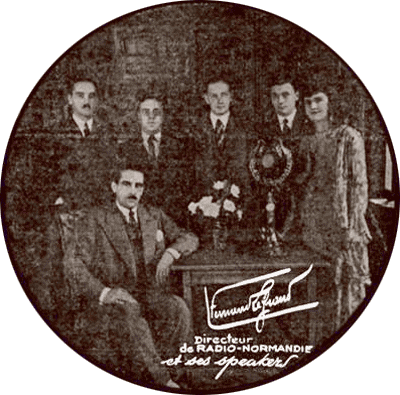
M. Le Grand entouré de ses speakers
- de g. à dr. : Pierre Garnier, Roland Violette,
Pierre Legros (sous réserve), René Malandain, Francine Lemaître
(ph. Le Haut-Parleur)
Mr. Le Grand surrounded by his speakers
Francine Lemaître (Tante Francine) présentatrice

Francine Lemaître "Annonciatrice", (le terme "animatrice" n'existait pas !)
Pâques 1929 : Francine Lemaître est
d'abord engagée comme secrétaire
Easter 1929: announcer Francine Lemaître is first hired as secretary
 > Courte biographie de Francine Lemaître / See annex Francine Lemaître > Courte biographie de Francine Lemaître / See annex Francine Lemaître

Quelle belle
opportunité que d'avoir un micro pour s'exprimer ! Cela peut intimider au
début, mais c'est une chance incroyable.
What a wonderful opportunity to have a
microphone to express yourself! It can be intimidating at first, but it's an
incredible opportunity.
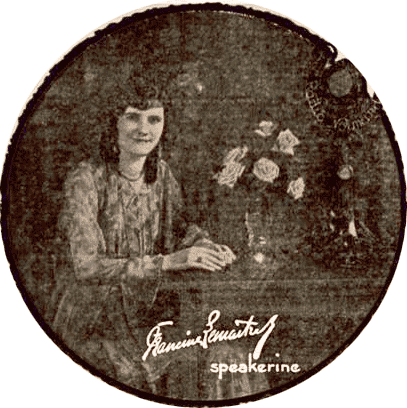 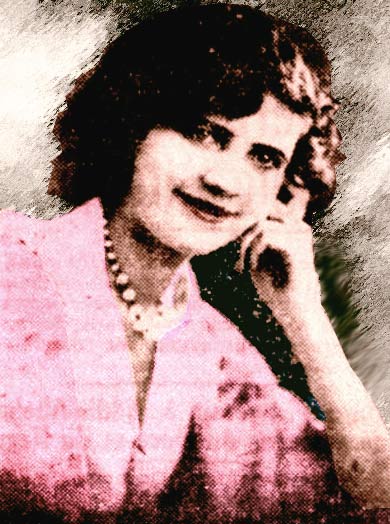
Francine Lemaître
Speakerine de Radio-Normandie

photo Wireless Magazine (5.08.1932)
|
La radio pour l’auditeur, ce sont d'abord des voix qui s'invitent chez lui. Elles lui deviennent familières. Radio 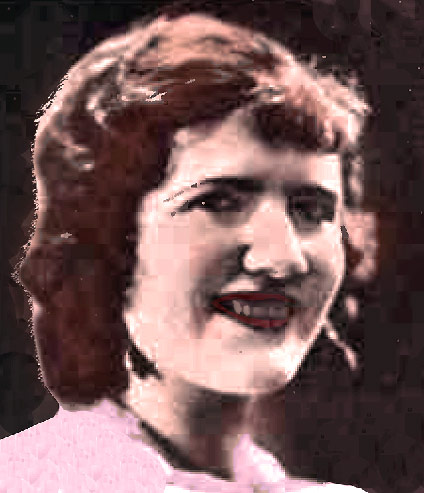 Normandie fut la première station où une voix féminine s'imposa, celle de Tante Francine
> Normandie fut la première station où une voix féminine s'imposa, celle de Tante Francine
>
En 1929, Fernand Le Grand recherche une sténodactylo pour prendre par téléphone les communiqués de Paris-Soir, qu'il relira presque simultanément au micro dans le cadre du journal parlé. Francine Lemaître, troisième fille d'une famille de six enfants est sténodactylographe dans un cabinet d'assurances fécampois.
Deux mois après son recrutement, M. Le Grand
retenu à l'extérieur,
en déplacement au Havre, a un empêchement et ne pourra pas être derrière le micro à l'heure où il doit intervenir.
Il demande à Francine de le remplacer.
Après des instructions rapides et quelques tâtonnements, Francine Lemaître, sans expérience, prend possession du micro. Cet imprévu est une réussite.
Le plaisir des auditeurs à la découverte de cette voix charmante est proportionnel au volume du courrier reçu. Ils manifestent leur plaisir d'entendre une voix joliment timbrée, nette et riche de nuances. Et c'est ainsi, sans cesser d'être sténo, que Francine Lemaître devint speakerine, la première de France et la plus jeune en Europe. |
Radio for the listener is first and foremost voices that invite themselves to their homes. They become familiar to him. Radio Normandy was the first station where a female voice prevailed, that of Aunt Francine.
( < photo)
In 1929, Fernand Le Grand looked for a shorthand typist to take Paris-Soir press releases by telephone, which he would reread almost simultaneously at the microphone as part of the spoken newspaper. Francine Lemaître, third daughter of a family of six children, is a shorthand typist in an insurance firm in Fécamp.
Two months after he was recruited, Mr Le Grand, who was away on a trip to Le Havre, was unable to be behind the microphone at the time he was due to speak. He asked Francine to stand in for him. After a few quick instructions and a bit of trial and error, Francine Lemaître, who had no experience, took over the microphone. This unforeseen event was a success. The pleasure of the listeners at the discovery of this charming voice is proportional to the volume of mail received. They were delighted to hear a beautifully timbred voice, clear and rich in nuance. And so, without giving up being a stenographer, Francine Lemaître became the first female announcer in France and the youngest in Europe. |
|
Tous les soirs à 18 h, les enfants ont rendez-vous avec Tante Francine et Oncle Roland. |
Every night at 6:00, the kids have an appointement with Aunt Francine and Uncle Roland. |
|
Roland Violette (Oncle Roland) présentateur
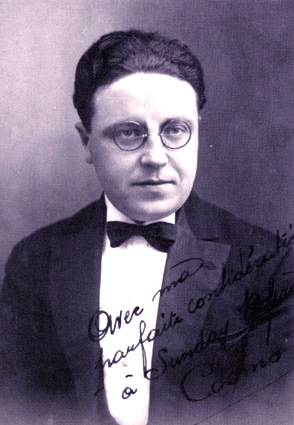
Roland Violette (Oncle Roland) avec une dédicace signée "Cosmo" (explications ???) pour le "Sunday Referee"
le journal anglais qui a publié le premier les programmes de Radio Normandy : "Avec ma parfaite considération à Sunday Referee"
Roland Violette (Uncle Roland) with a dedication signed "Cosmo" (explanations ???) for the "Sunday Referee" the first English
newspaper to announce the programs of Radio Normandy :"With highest consideration to Sunday Referee"
|
Oncle Roland, voix célèbre
de la station
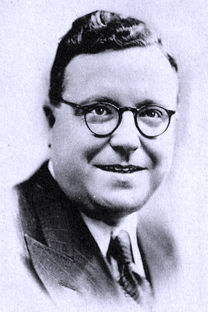 Roland Violette, typo-graphe est aussi comédien amateur. Sa voix chaude et son élocution facile lui permet d'être engagé à Radio Normandie. Roland Violette, typo-graphe est aussi comédien amateur. Sa voix chaude et son élocution facile lui permet d'être engagé à Radio Normandie.
Il va parcourir la province à bord du car de reportage et retransmettre les événements sportifs ou culturels. C'est lui qui va créer avec Francine l'association des petits auditeurs qui atteindra 30.000 adhérents.
Roland Violette, acteur amateur d’une troupe de comédiens d'Elbeuf passe un jour au micro et est aussitôt remarqué. Il devient à son tour animateur. C’est lui qui a l’idée de créer une section des "Petits Auditeurs".
Il propose à Francine Lemaitre :
"Vous serez la
Tante Francine et moi l’Oncle Roland". L'émission enfantine est émise chaque jour à 18 h 00 et recueille un grand succès. L'Association des Auditeurs - section enfantine - réunit 30.000 jeunes adhérents qui s’ajoutent au chiffre des adultes. La cotisation annuelle pour les enfants est de 5 francs.
Un groupe vocal théâtral participe à l'émission. Il est formé de Jacqueline Caron, Roseline Moello, Manuella Féron, Annette Villard, Jacqueline Horlaville, Jean Hauguel, Brigitte, Agnès, Marie Claude, Thérèse, Huguette, Jacques, Pierrot, et l’inimitable Petit Claude Violette, sous la direction de Mme Delacour, professeur de piano.
> A suivre
on reparlera de
"L'heure enfantine"
plus tard à notre paragraphe >
1936 |
Uncle Roland, famous
French voice of the station
Roland Violette, typographer is also an amateur actor. His easy speech allows him to be hired at Radio Normandie.
He will travel the province aboard the reporting bus and broadcast sporting or cultural events. It is he who will create with Francine the association of small listeners which will reach 30,000 members.
Roland Violette, an amateur actor in a troupe of comedians from Elbeuf, comes to the microphone one day and is immediately noticed. He in turn becomes a facilitator. He was the one who came up with the idea of creating a "Little Auditors" section.
He suggests to Francine Lemaitre: "You will be Aunt Francine and I will be Uncle Roland". The children's program is broadcast daily at 6:00 p.m. and is a great success. The Auditors' Association - children's section - brings together 30,000 young members who add to the number of adults. The annual subscription for children is 5 francs.

A theatrical vocal group participates in the show. It is made up of Jacqueline Caron, Roseline Moello, Manuella Féron, Annette Villard, Jacqueline Horlaville, Jean Hauguel, Brigitte, Agnès, Marie Claude, Thérèse, Huguette, Jacques, Pierrot, and the inimitable Petit Claude Violette, under the direction of Ms. Delacour, piano teacher. |
|
René Malandain présentateur
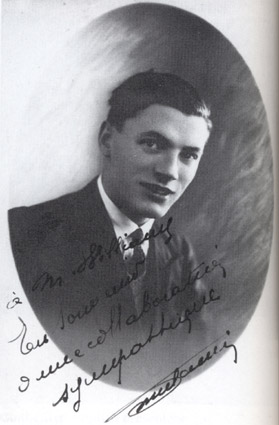
Ci-dessus une rare photo de René Malandain présentateur français avec une dédicace pour son ami Stephen Williams, speaker anglais :
"A Mr Williams, en souvenir d'une collaboration sympathique". Aucune anecdote connue sur cet animateur. Sachant que Stephen Williams (photo >) a séjourné à Fécamp de février à juin 1932 avant son départ pour Radio Paris en 1933, on peut situer leur rencontre à ce moment.
Above is a rare photo of René Malandain French presenter with a dedication for his friend Stephen Williams, English speaker:
“To Mr Williams, in memory of a friendly collaboration”. No anecdotes known about this host. Knowing that Stephen Williams (photo >) stayed in Fécamp from February to June 1932 before his departure for Radio Paris in 1933, we can place their meeting at this time.
| 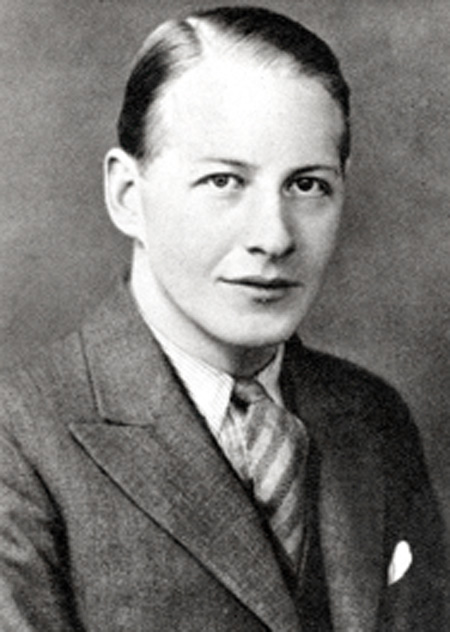
Stephen
Williams
dont on reparlera plus loin
who will be
discussed later
|
Pierre Garnier présentateur
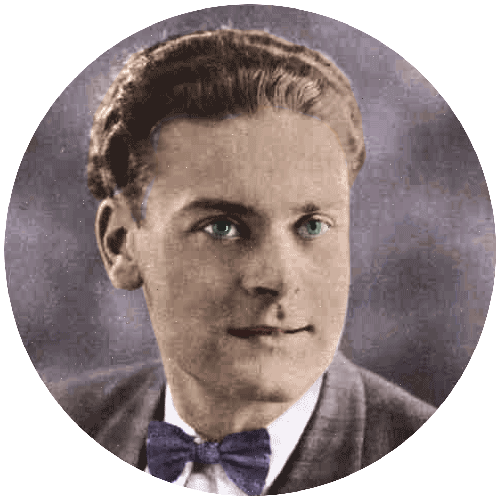
Pierre Garnier présentateur français bilingue, a participé également aux émissions anglaises.
Puis a quitté la station pour se rendre à Radio Juan-les-Pins (Côte d'Azur) et plus tard Monte-Carlo
Pierre Garnier, bilingual French presenter, also participated in English broadcasts.
Then left the station to go to Radio Juan-les-Pins (Côte d'Azur) and later Monte-Carlo
Roger Olivier présentateur français

Roger Olivier présentateur (hélas pas de photo). Il a aussi participé aux émissions anglaises
Roger Olivier presenter (unfortunately no photo). He also participated in English broadcasts
Madame Delacour
- Pianiste émission enfantine
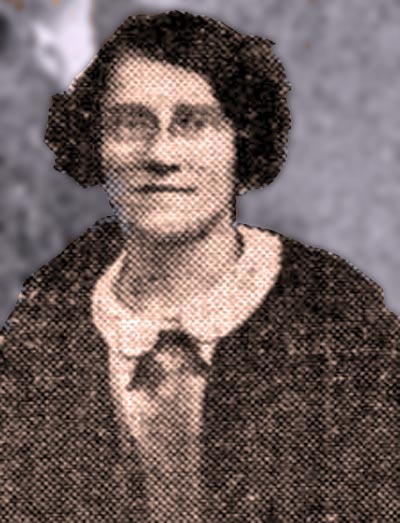
Jean Le Povremoyne - Journaliste/Reporter sportif

Jean (Jehan) Le Povremoyne
|
Ernest Eugène Coquin, plus connu sous le nom de Jehan Le
Povremoyne,
est né au Havre le 14 avril 1903 et est mort au Tréport le 10
avril 1970.
Orphelin très jeune, élevé par sa grand-mère, puis par ses
tantes, il témoignera à travers ses ouvrages de l’attention
qu’il a su, durant toute son existence, porter aux êtres et aux
choses.
Il sera romancier, conteur, nouvelliste et poète. Jehan Le
Povremoyne a gagné sa vie comme journaliste, d’abord au Havre-Éclair et
publiera son premier livre de nouvelles en 1926, "Mon Curé",
puis
après
la guerre, il sera journaliste à Paris Normandie jusqu’à sa
retraite en 1968.
Il a également été le maire de Robertot de 1945 jusqu’à sa mort. |
AUTRES PRESENTATEURS FRANçAIS - OTHER FRENCH ANNOUNCERS :
(pas de photos, hélas)
André Bécasse (Cousin André)
Maurice Bénard (Cousin Maurice)
Joseph Blondel - Speaker à Rouen (jusqu'en 1936)
Lucien Levallois (Simplice)
Gustave Milet - Journaliste
Nicolas
(?)
Roger Queval - Speaker à Rouen - Chef d'orchestre
Marc Swartz (?)
(liste non exhaustive)
- - - - - - - - -

JOURNALISTES EXERçANT DEPUIS LA
RéDACTION DE PARIS-SOIR
JOURNALISTS FROM THE PARIS-SOIR PREMISES :
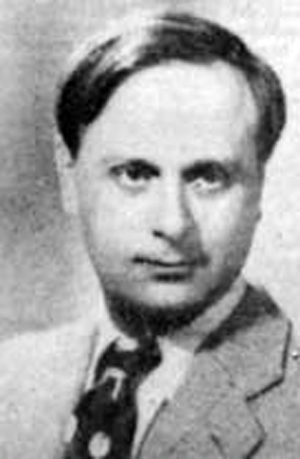
Fernand Pouey
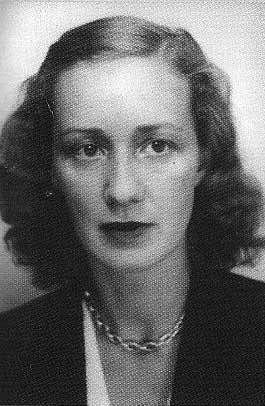
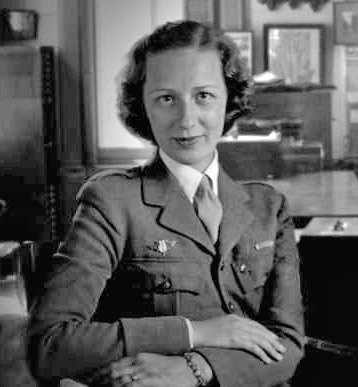
Marie-Madeleine Meric (devenue Marie-Madeleine Fourcade)
a été chroniqueuse de mode à Radio Cité
- - - - - - - - -
Ces animateurs ont contribué à faire de
Radio-Normandie "le poste le plus gai de cette époque",
diffusant une variété de programmes incluant des émissions pour enfants, des
retransmissions
sportives, des spectacles de variétés et des informations culturelles
These presenters helped make
Radio-Normandie "the most cheerful station of its time"
broadcasting a variety of programs including children's shows, sports
broadcasts,
variety shows, and cultural news.
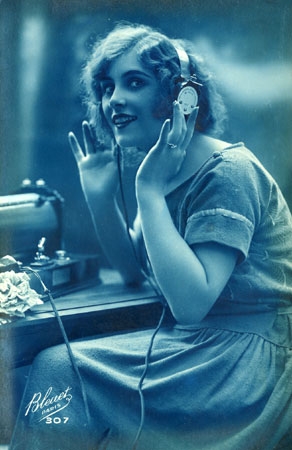
Jeune auditrice surprise en pleine réception... mais ce n'est pas Francine !
Young listener surprised in the middle of a reception... but it's not Francine!
|
| |
|
|